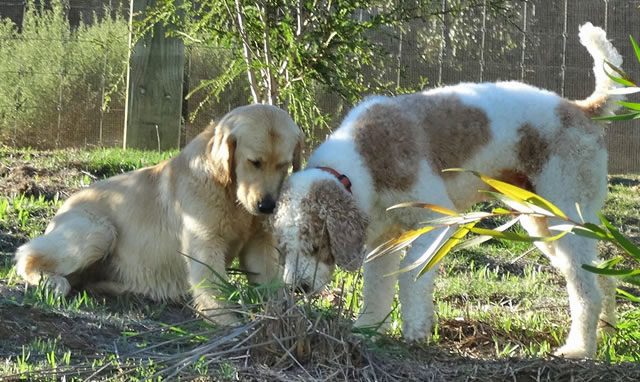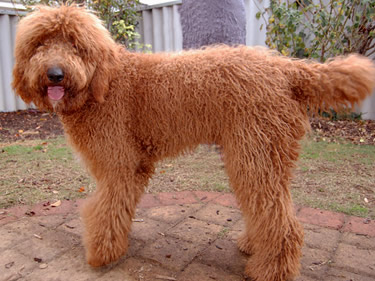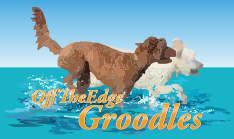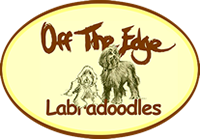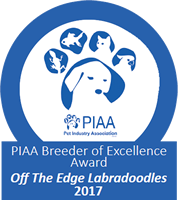Groodle Care

We will give your puppy its first set of vaccinations. You will receive these records. The puppy’s boosters are due at 12 to 14 weeks.
Your puppy will have had a thorough vet check at six weeks. The puppy is microchipped, and vaccinated with C5.We will let you know the date of its next vaccination. Meeting or contacting your Vet prior to puppy coming home is a good opportunity to ask any questions; are any problem disease outbreaks in your area such as Parvo virus (this is worse in summer), heart worm, ticks (usually if you go to the coast), worms?
Second Vaccination
When you take your puppy to the vet for its second vaccination, carry it in your arms (keep off vets floor) to prevent contracting diseases that it is not fully covered for yet. You will not have to do this every time you go to vet, just till it is immune.
Expect loose poohs for 24 hours, and if you see worms don't panic, but worm again in 2 weeks. Check this info with your vet, just to be sure.
Intestinal Worming
Worm your pup for roundworm, tapeworm, hookworm, etc. regularly. Puppies are wormed at 2, 4, 6,8 weeks, ten weeks, twelve weeks, then at four months, five months and six months, and then once every three months after that.
Expect loose poohs for 24 hours, and if you see worms don't panic, but worm again in 2 weeks. Check this info with your vet, just to be sure.
Flea and Tick Treatment
For fleas we recommend Frontline Plus, (also Sentinel, Comfor tis or Advantage). It is much easier to prevent fleas at the puppy stage, than to try and remove infestations on your puppy and in your house, later on. If you are in a tick area (check with your Vet), it is recommended to treat every two weeks.
From 12 weeks onwards for tick prevention, a Preventic Tick Collar can be used if that is the option you prefer. Do not double up on a tick collar and spot on tick treatment, if the label does not authorise it
Heartworm
Heartworm treatment can commence at 2-3 months of age or whenever your vet recommends, and your puppy could have been exposed to heartworms somewhere along the line, so even if you don’t have Heartworm problems where you live, it is best to treat your puppy once at 2-3 months of age. Use the monthly only heartworm treatments, not any long term products or injection or your warranty will not be valid.
Off the Edge Labradoodles does not support the use of the 12 month Heartworm injection. Our warranty will not cover medical conditions suspected to be a result from the use of the Heartworm injection. Can you imagine what is in the 6-12 month injection, that enough poison is introduced in one dose to your dog so that for 6-12 months the heartworm larvae are continuously being destroyed? It must be a massive dose of long lasting super poison. Would you want it to ingest this amount of needless poison and then wonder why your dog develops auto-immune diseases? These long-term heartworm treatments have only recently been re-introduced in the US, as they were banned there for years due to numerous deaths and the debilitating side affects.
Hip Care
Hip Dysplasia at the most simplistic level is a disease in which the femur bone in the rear legs of dogs does not fit properly into the ball and socket joint at the hips. Many dogs are crippled by this disease and other dogs that have the disease, though not crippled, experience pain in the joint and have limited function. We frequently read articles and scientific studies which assert that hip dysplasia is 50% genetics and 50% environment (some suggest as high as 70% may be attributed to environment). We prefer to think of it as 100% genetics, and 100% environment.
Genetic considerations are the 100% of what we must consider as breeders. Once that puppy is born, environment is 100% of how well that puppy will do within the possibility of his/her genetics. We have done what we can to ensure that your puppy came from parents who were health tested for hip and elbow disorders and that the puppies’ diet and early weeks were healthy and accident free.
Now it’s your turn. Please don’t over feed your dog, being overweight places stress upon their developing joints and even their adult joints. Weigh your dog regularly and adjust its feed accordingly with the help of your veterinarian. (If you have been pregnant you will know what a few extra pounds can do to your joints). If you are going to feed predominately a raw or home-made diet, then it is very important you have a good understanding of calcium and phosphorous levels, as well as nutrition in general.
Phosphorous for instance ties up available calcium and too much calcium is almost as bad as not enough. Talk to your vet or an animal nutritional specialist about these matters. IMPORTANT: until the puppy has reached the age of 12 months, be careful with stairs, jumping in and out of cars, running after balls/sticks/Frisbees/etc., running behind a bicycle, rough play and accidents in general – injury can lead to problems.
Up to 12 months of age, the skeletal structure is developing and it needs to develop in a normal way so that it is strong and healthy, to make sure the dog has a long pain free life.
Fitness
If your dog is not receiving regular exercise then don’t push it too hard. Dogs who have the opportunity to freely exercise during the day and receive regular/daily exercise with you, statistically have less joint issues. In fact dogs whose x-rays indicate they have very shallow sockets can exhibit no signs of it until a very late age if they have been well cared for and remain fit. Finally dogs should be walked on a ‘loose’ lead, if you are constantly pulling against your dog then seek assistance from a dog trainer. Some of the breeder’s from other breeds swear this causes many of, if not most, problems.

Pull muscles and favour a particular leg, be at a greater risk of accidents whilst exercising because of your poor fitness levels?



